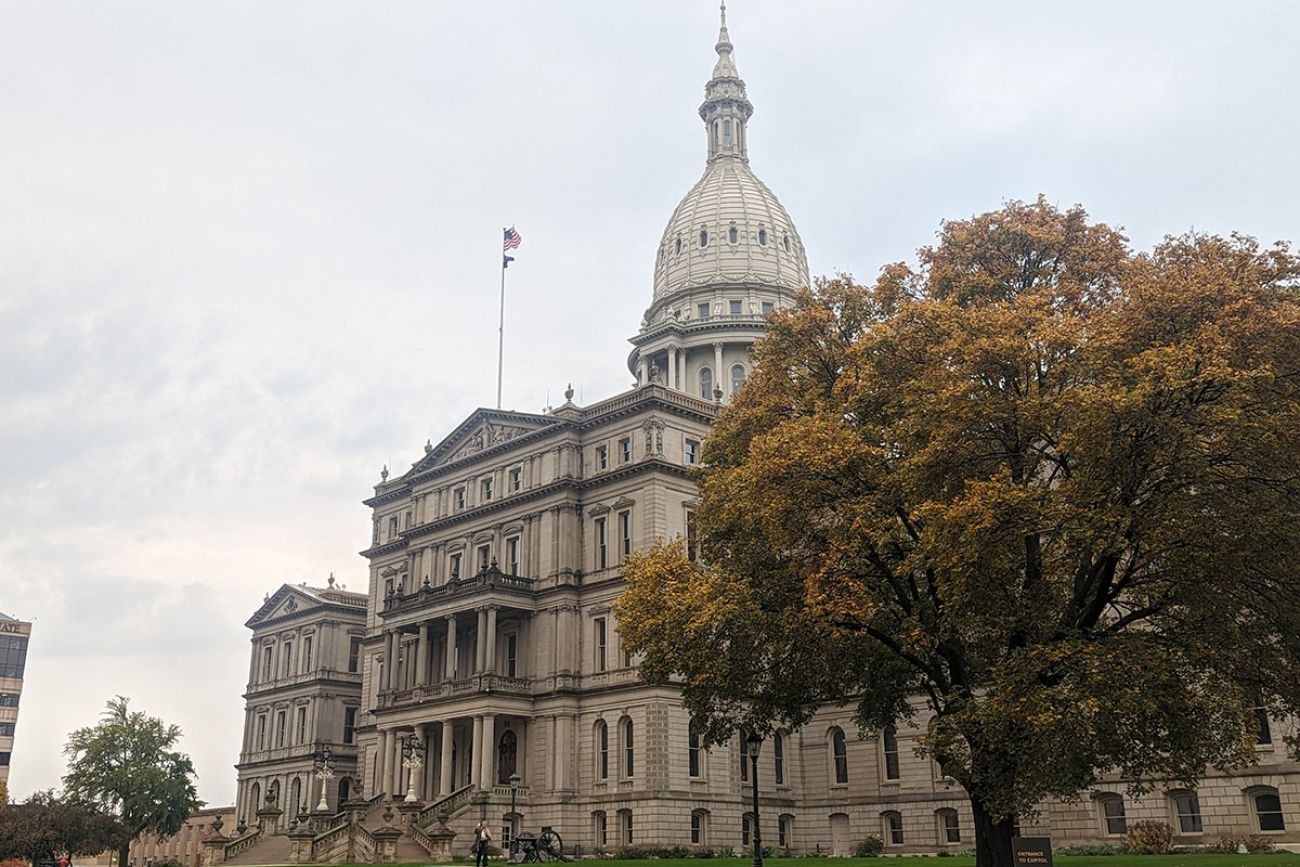Battle lines drawn in fight for Michigan House majority: What to know


- Fields set as Republicans, Democrats battle for control of the Michigan House
- Both parties targeting swing districts, including six Democrats won by fewer than 2,000 votes in 2022 for a narrow two-seat majority
- Several incumbents facing primary challenges, including both major party leaders and a trio of far-right Republicans
One of Michigan’s biggest political fights of the year — the battle for control of the state House — is officially underway.
Candidate lists were finalized this week for each 110 House districts, all of which are up for election in November as Democrats seek to defend their narrow, two-seat edge.
Both major parties are targeting swing districts, incumbents are facing primary challenges and term-limit reforms have opened the door for former lawmakers to make another run.
The stakes couldn’t be higher: In 2022, Democrats secured slim majorities in the House and Senate and swept statewide offices for the first time in decades. They worked with Gov. Gretchen Whitmer to pass a sweeping legislative agenda.
Related:
- Democrats are back in power in Lansing. Their wish list is slim
- Who’s running for Congress in Michigan? 6 incumbents face primary challengers
- Democrats ditching Whitmer plans for Michigan trash fee hike, EV rebates
Now, Democratic officials say they’re pulling out all the stops to keep their grip on Lansing during the final two years of Whitmer’s tenure.
“It's going to be a big lift, just like it was a big lift to get the majority,” Democratic Party Chair Lavora Barnes told Bridge Michigan. “I think the good news is that we now have a terrific record to run on to talk to the people of Michigan about the difference that has been made in their lives.”
The campaign cash is already flowing. Political action committee fundraising totals filed this week showed House Democrats raised $2.2 million this quarter, spent $417,551 and have $5.32 million in the bank.
House Republicans raised $1.3 million over the same time frame, spent $132,820 and have $5.38 million on hand. Republican lawmakers pointed to the slightly larger campaign coffers as a sign they’re in good shape to retake majority control come November.
“Because of our proven track record, we will have the resources we need to get our message out in the months ahead,” Rep. Bill G. Schuette, R-Midland, said in a statement. “House Republicans are ready to win and we are doing the work every day to earn the trust and votes of people across our state.”
Stiff competition
All 110 districts have at least one Democrat and one Republican running for election, though the fight for majority will ultimately zero in on the most politically competitive districts.
Observers in both parties see potential flip opportunities, particularly in competitive districts where first-term lawmakers are vulnerable.
In 2022, Democratic candidates won by less than 2,000 votes in six districts covering Traverse City, the West Michigan lakeshore and Battle Creek, Macomb County and Downriver communities, making those regions top targets for Republicans.
Vulnerable incumbents in those districts include Reps. Betsy Coffia, D-Traverse City; Joey Andrews, D-St. Joseph; Jim Haadsma, D-Battle Creek; Nate Shannon, D-Sterling Heights; Denise Mentzer, D-Mt. Clemens; and Jamie Churches, D-Wyandotte.
Democrats are going on the offensive in several swing districts currently represented by Republicans in southeast Michigan, and are also eyeing pickups in Jackson, West Michigan and Genesee County.
Top targets include Reps. Donni Steele, R-Orion Township; Mark Tisdel, R-Rochester Hills; Jamie Thompson, R-Brownstown Township; Kathy Schmaltz, R-Jackson; and David Martin, R-Davison.
Primary challenges for House leaders, far-right conservatives
For many candidates, the fight begins now.
Dozens of House incumbents will have to fend off primary challengers, including House Speaker Joe Tate, D-Detroit, and Minority Leader Matt Hall, R-Richland Township.
Frustrated by what they view as a lack of influence in Lansing, several Republican primary challengers have come forward to run against ultra-conservative incumbents in the Legislature.
In northern Michigan’s 107th District, Harbor Springs business owner Parker Fairbairn will once again run against incumbent Rep. Neil Friske of Charlevoix, arguing in a campaign announcement that the district deserves a “conservative representative who will show up, sit on committees and actually do the work.”
Rep. Josh Schriver — an Oxford Republican who was stripped of his committee assignments for sharing a conspiracy theory popularized by the white supremacist movement — will face one challenger in the primary, and Rep. Steve Carra, a Three Rivers Republican who chairs the House Freedom Caucus, will face two.
Milford GOP Rep. Matt Maddock, a Trump ally who has clashed with House GOP leadership and falsely claimed buses carrying college basketball players were transporting “illegal invaders,” is facing a challenge from Milford Village Council member Kevin Ziegler, who called Maddock “an international clown.”
Former lawmakers return after term limit changes
Michigan’s new term limit law allows candidates to serve a total of 12 years in either legislative chamber, opening the door for former lawmakers previously termed out after six years in the House to run again.
Several lawmakers chose to do so, including former Rep. Tommy Brann, a Wyoming Republican who was termed out in 2022 but is now hoping to challenge Rep. John Fitzgerald, D-Wyoming, in West Michigan’s 83rd District; and former Rep. Tim Sneller, a Burton Democrat also termed out in 2022 but is now challenging Martin in Genesee County.
Other ex-lawmakers angling to return to the Capitol next year include former Republican Reps. Gary Eisen, R-St. Clair Township, Nancy Jenkins-Arno, R-Clayton, Tim Kelly, R-Saginaw, and former Democratic Reps. LaTanya Garrett, D-Detroit, and Richard Steenland, D-Roseville.
The 12-year term limit rule applies to time served in both chambers, meaning lawmakers who aren’t running despite being eligible for re-election could be leaving options open for a future state Senate run.
New Detroit districts, big primary fields
Metro Detroit state House districts will have new boundaries starting this cycle after a federal court ordered Michigan’s independent redistricting commission to redraw the maps after concluding commissioners improperly used racial data to dilute the power of Black voters.
All of the affected seats trend Democratic, and no incumbent Detroit-area lawmakers had to move or run against a fellow lawmaker under the new map.
But substantially different district configurations that adhere more closely to county and municipal boundaries and increase the number of majority-Black districts could offer inroads for primary challengers.
Incumbents in 11 of 16 Detroit or Detroit-adjacent districts face at least one primary challenger, including House Speaker Joe Tate, D-Detroit.
One notable Democratic primary battle is brewing in the 14th District, where longtime Warren Mayor Jim Fouts is challenging first-term Rep. Mike McFall of Hazel Park.
Incumbent Rep. Abraham Aiyash, D-Hamtramck, bowed out of running for re-election in the 7th District, leaving the primary in the heavily Democratic district open for three Detroit-based hopefuls.
Steenland, the former Roseville lawmaker, was primaried out of a re-election bid in 2022 by Rep. Kim Edwards, an Eastpointe Democrat. Under the new House map, Steenland is now among those challenging Rep.-elect Mai Xiong, a Warren Democrat who was elected in April to fill a partial term.
See what new members are saying about why they donated to Bridge Michigan:
- “In order for this information to be accurate and unbiased it must be underwritten by its readers, not by special interests.” - Larry S.
- “Not many other media sources report on the topics Bridge does.” - Susan B.
- “Your journalism is outstanding and rare these days.” - Mark S.
If you want to ensure the future of nonpartisan, nonprofit Michigan journalism, please become a member today. You, too, will be asked why you donated and maybe we'll feature your quote next time!


